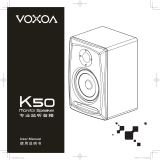
18
GENERAL INSTRUCTIONS
Your Weber
®
gas barbecue is a portable outdoor cooking appliance. With the Weber
®
gas barbecue you can grill, barbecue, roast and bake with results that are difficult to
duplicate with indoor kitchen appliances. The Weber
®
gas barbecue is portable so you
can easily change its location in your yard or on your patio. Portability means you can
take your Weber
®
gas barbecue with, if you move.
Liquid Propane (LP) gas supply is easy to use and gives you more cooking control than
charcoal fuel.
• These instructions will give you the minimum requirements for assembling your
Weber
®
gas barbecue. Please read the instructions carefully before using your
Weber
®
gas barbecue. Improper assembly can be dangerous.
• Not for use by children.
• If there are local codes that apply to portable gas grills, you will have to conform to
them. Installation must conform with local codes or, in the absence of local codes,
with either the National Fuel Gas Code, ANSI Z223.1/NFPA 54, Natural Gas and
Propane Installation Code, CSA B149.1, or Propane Storage and Handling Code,
B149.2, or the Standard for Recreational Vehicles, ANSI A 119.2/NFPA 1192, and
CSA Z240 RV Series, Recreational Vehicle Code, as applicable.
• The pressure regulator supplied with the Weber
®
gas barbecue must be used. This
regulator is set for 11 inches of water column (pressure).
• This Weber
®
gas barbecue is designed for use with liquid propane (LP) gas only.
Do not use with natural (piped in city) gas. The valves, orifices, hose and regulator
are for LP gas only.
• Do not use with charcoal fuel.
• Check that the area under the control panel and the bottom tray are free from
debris that might obstruct the flow of combustion or ventilation air.
• The areas around the LP cylinder must be free and clear from debris.
• Replacement pressure regulators and hose assemblies must be those specified by
Weber-Stephen Products Co.
FOR INSTALLATION IN CANADA
These instructions, while generally acceptable, do not necessarily comply with the
Canadian Installation codes, particularly with piping above and below ground. In
Canada the installation of this appliance must comply with local codes and/or Standard
CSA-B149.2 (Propane Storage and Handling Code).
OPERATING
WARNING: Only use this barbecue outdoors in a well-
ventilated area. Do not use in a garage, building, breezeway
or any other enclosed area.
WARNING: Keep ventilation openings for cylinder enclosure
free and clear from debris.
WARNING: Your Weber
®
gas barbecue shall not be used
under overhead combustible construction.
STORAGE AND/OR NONUSE
• The gas must be turned off at the liquid propane cylinder when the Weber
®
gas
barbecue is not in use.
• When the Weber
®
gas barbecue is stored indoors, the gas supply must be
DISCONNECTED and the LP cylinder stored outdoors in a well-ventilated space.
• LP cylinder must be stored outdoors in a well -ventilated area out of reach of
children. Disconnected LP cylinder must not be stored in a building, garage or any
other enclosed area.
• When the LP cylinder is not disconnected from the Weber
®
gas barbecue, the
appliance and LP tank must be kept outdoors in a well-ventilated space.
• The Weber
®
gas barbecue should be checked for gas leaks and any obstructions
in the burner tubes before using. (See Section: “Maintenance/Annual
Maintenance).
• Check that the areas under the control panel and the slide out bottom tray are free
from debris that might obstruct the flow of combustion or ventilation air.
• The Spider /Insect Screens should also be checked for any obstructions.
(See Section: "Maintenance/Annual Maintenance").
WARNING: Your Weber
®
gas barbecue is not intended to be
installed in or on recreational vehicles and/or boats.
WARNING: Do not use the barbecue within 24 inches of
combustible materials to the back or sides of the grill.
WARNING: The entire cooking box gets hot when in use. Do
not leave unattended.
WARNING: Keep any electrical supply cord and the fuel
supply hose away from any heated surface.
WARNING: Keep the cooking area clear of flammable vapors
and liquids such as gasoline, alcohol, etc., and combustible
materials.
WARNING: Never store an extra (spare) LP cylinder under or
near the Weber
®
gas barbecue.
WARNING: The LP cylinder used with your barbecue
must be with a listed OPD (Overfilling Prevention Device)
and a QCC1 or Type 1 (CGA810) cylinder connection. The
cylinder connection must be compatible with the barbecue
connection.






















